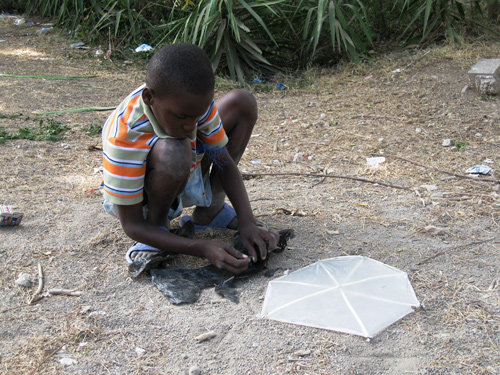Where laughter endures

Oxfam America’s Coco McCabe is one of several Boston-based colleagues who traveled to Haiti to help with the relief effort. Here’s her latest update, dated February 1.
Tonight’s my last in Port-au-Prince before flying back to Boston. I arrived here about a week after earthquake. And every day, as I visited the temporary camps where families have slung together shelters of bed sheets or cardboard, the intensity of human need seemed as fierce as the day before–for food, for work, for a decent place to sleep and bathe and go to the bathroom—even as Oxfam is building latrines and setting up water sources as fast as possible.
The hardship people are enduring is profound. I won’t forget it.
But there’s something else I won’t forget either: the ingenuity of the kids and their ability to set aside their worries, even if it’s for only a few minutes, and find the salve that sooths magically: play.
Today, I saw the best thing yet. It was at the crowded Centre Sportif de Carrefour, a sports complex where more than 2,000 people are camped on concrete and hard-packed earth. Weaving between the tents made of tarps from China were small boys—first one, then another, and another. All of them were pulling cars on strings. On closer examination, I realized the cars were small plastic juice jugs, outfitted with axels made from lollipop sticks, and wheels made from the red caps of other juice bottles. For ballast, the boys had loaded their cars with stones. Strips of plastic, tied together, served as strings for towing them.
They were ingenious.
As ingenious as the kites dancing over the hodge-podge of shelters at the impossibly crowded Petionville Club, a golf course where tens of thousands of people have staked out a small bit of turf to call home. Here, too, the kites have multiplied. Early in my stay, I saw one or two. Today, there was a whole fleet, bobbing over different parts of the camp.
One boy carried his kite carefully, proudly almost, the way a warrior might carry his shield. I asked if I could examine it for a moment, curious how a kite made under these camp conditions—where so much is lacking—could stay aloft. It was surprisingly light, and made of scraps scavenged, probably, from the camp: a cross of sticks served as the frame, with a swatch of clear plastic stretched over it. A tail of feathered black plastic fluttered in the wind. With a wad of string wound tight, the boy was ready to let his treasure fly.
A few days before, I had seen another bit of fleeting fun at this golf course—gone now because the camp has become even more crowded. On a long steep slope, where brown grass gave way to dust, a crew of boys had discovered that sheets of cardboard made fine toboggans. Careening down the hill, the boys came in waves, clouds of dust swallowing them and their cardboard, and piled into one another in a heap at the bottom, laughing.
I was with one of owners of the golf course that day, touring the perimeter to determine where Oxfam could set up some latrines and bathing stalls. Distraught as he was at the transformation of his exclusive club into a camp for the masses, even he seemed to take delight in the joy of a wild ride down a hill. I heard him mutter, “People wanted to establish a golf course. It should be a ski area.”
Here, where people have so little, whatever is at hand becomes a toy. I saw boys playing kickball with a plastic bottle, partially filled with water to give it heft. Two others, tiny ones, dragged sticks through the dust, watching the lines they made zigzag behind them.
At Delmas 75, an orderly camp in a vacant lot, girls with a strand of battered rope took turns jumping high as the others swung. Beyond them, boys darted between the tents and shelters in a game of hide and seek. And even the adults were finding some solace in play: an all-afternoon dominos match erupted, alternately, in heated debate and laughter.
Amidst the wreckage of a city and the sorrow so many now bear, it’s those bursts of laughter—surprising, spontaneous, alive—that help everyone here endure.
Invest in Haiti’s recovery by donating to Oxfam’s Haiti Earthquake Response Fund.
Learn more about how Oxfam is responding